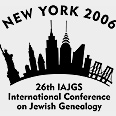
Gathering of the clans
International Jewish genealogy researchers and experts to meet in New York
Catering to everyone from absolute beginners to professionals, the conference is an important method of showcasing the field’s achievements and new resources, presented by experts, including university academics, archive directors and museum staff.
Conference-goers attend organized activities over six days from early morning to late at night, and network over a meal or coffee. Many arrive before opening day or stay later to carry out research in the New York’s renowned archives and libraries.
Conference co-chairs Linda Cantor and Hadassah Lipsius have the welcome mat out for genealogists and their families to have a great time in the city. Cantor invites researchers from around the world to attend the conference, and to also “enjoy the many wonderful things that New York City offers.”
“We have some of the world’s best libraries, archival institutions, theaters, museums, cultural opportunities and shopping,” adds Lipsius. The Marriott Marquis venue, in Times Square, provides easy access to everywhere in the area.
The opening speaker will be the Ninth Archivist of the U.S., historian and author Dr. Allen Weinstein (www.jgsny2006.org), while award-winning writer and Columbia University professor of journalism Samuel G. Freedman (http://www.samuelfreedman.com), author of six books, including Who She Was: My Search for My Mother's Life, will speak at the banquet.
“As we worked on this year’s program,” says program chair Gloria Berkenstat Freund, “we decided to broaden the scope of previous conference, and this program will be the most ambitious, most international event so far.” Speakers are from many countries, including Australia, Czech Republic, France, Germany, Great Britain, Hungary, Israel, Lithuania, Poland, Ukraine, Uzbekistan and the U.S.
Browse the preliminary (more will be added) list of topics and speakers at www.jgsny2006.org/sessions.cfm. A sampling includes Sephardic genealogy, Polish resources, travel for the genealogist, and a series of Russian topics to assist the large New York Russian émigré population. Panels of experts will focus on Eastern European cemetery restoration, teaching genealogy for all ages and DNA, genetics and genealogy.
“Speakers include New York City area repository archivists and international archivists from our ancestors’ home countries,” says Freund, adding that the first-ever dedicated hands-on computer lab will teach everything from genealogical applications of Excel and PowerPoint, to producing websites, accessing JewishGen databases and a range of Internet resources.
For beginners, the conference will offer special classes, networking opportunities and the chance to spend personal time with experts and archivists.
Many special interest groups (SIGs) covering geographical and topical interests set meetings, programs and luncheons at the event. They enable members of the mainly online communities to meet in person, present new resources or information and share research on common names and places. Litvak SIG, JRI-Poland, Belarus SIG and the Sefard SIG are only some of those meeting
Special evening programming includes noted pianist and conductor Zalmen Mlotek, Folksbiene Yiddish Theater executive director. An internationally recognized authority on Yiddish folk and theater music, Mlotek will perform European and American songs on Jewish life, including folksongs, immigration, the Yiddish theater and vaudeville.
As news of the international conference spreads, says registration chair Roni Seibel Liebowitz, the website receives 700 daily hits. Attendees already registered come from 13 countries with the US, Canada, Israel and Australia in the lead, followed by Uzbekistan, Greece and Ukraine. In the US, attendees come from 28 states – about 20 percent from New York, followed by California, Florida and Maryland.
The annual events are always welcoming to beginners – even seasoned researchers readily admit that they were once innocent newcomers who barely knew what questions to ask.
“Although I asked very basic questions, everyone was helpful and willing to impart their wisdom to a real beginner,” says Freund, recalling her first conference in Washington, DC in 1995. At that point, she realized that conference lectures were the icing on the cake.
“Contact and interaction with other researchers who felt as I did – that I was doing important work in memorializing my ancestors, many of whom perished in the Holocaust – provided the strength to continue my research, even though I faced seemingly impenetrable brick walls.”
Freund spent years breaking through those walls, learning that the attempts were worthwhile, and that achieving success was an “incomparable experience.”
Liebowitz also remembers her first event. “I was so swept up by everyone’s enthusiasm that even though I had little experience, I volunteered as a Jewish Records Indexing-Poland Shtetl Co-op Coordinator. It was a great learning experience and I have made many lifetime friends.”
Israeli researchers have had similar experiences.
A former Londoner living in Ra’anana, Ingrid Rockberger’s first event was the 2004 Jerusalem conference, hosted by the Israel Genealogical Society (one of three societies in Israel). “I was amazed how many wildly enthusiastic and knowledgeable people were there,” she says, adding that she acquired information for her own research.
The icing on Rockberger’s cake was the purchase – from a conference vendor – of the Yizkor (memorial) book from her maternal grandfather's hometown, which included an ancestor’s photo. “I came away from the conference feeling I wanted to devote myself full-time to genealogical research.”
Today, as chair of JFRA Israel’s Raanana branch, she assists other researchers to learn about their families.
An excellent way to network with international researchers is to volunteer. The conference is planned and staffed by volunteers – members and friends of the host society – who have been focused on the event for two years.
“The results are worth it,” says co-chair Cantor. “All our volunteers are appreciated and we always need more help.” Once the event opens, assistance will be needed in areas including registration, hospitality and translation.To volunteer, see http://www.jgsny2006.org/vol_survey.cfm
For all conference details, visit the conference website, www.jgsny2006.org; online conference and hotel registration is user-friendly.










